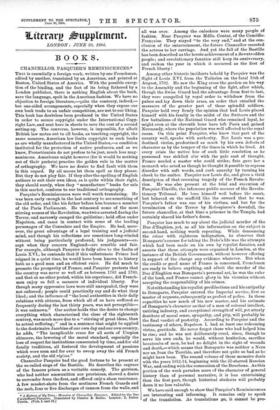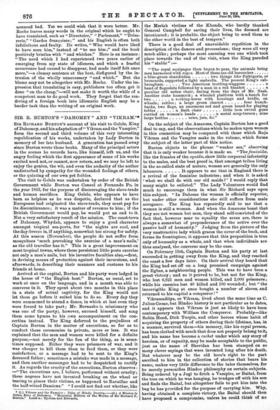BOOKS.
CHANCELLOR PASQ17IER'S REMINISCENCES.* This is essentially a foreign work, written by one Frenchman, edited by another, translated by an American, and printed at Boston, United States of America. With the possible excep- tion of the binding, and the fact of its being fathered by a London publisher, there is nothing English about the book, save the language, spelt in the American fashion. We have no objection to foreign literature,—quite the contrary, indeed,— but one-sided arrangements, especially when they expose our own book trade to an unfair competition, are not to our liking. This book has doubtless been produced in the United States in order to secure copyright under the International Copy- right Law, and sent here in sheets to save the coat of a second setting-up. The converse, however, is impossible, for albeit British law metes out to all books, as touching copyright, the same measure, American law limits copyright to such books as are wholly manufactured in the United States,—a condition instituted for the protection of native producers, and as we know, Protectionists do not profess to be just, much less mag- nanimous. Americans might however (for it would be nothing out of their pockets) practise the golden rule in the matter of orthography. We have no desire to find fault with them in this regard. By all means let them spell as they please. But they do not play fair. If they alter the spelling of English authors to suit their own ideas, as is quite within their right, they should surely, when they "manufacture " books for sale in this market, conform to our traditional orthography.
Pasquier's Reminiscences were well worth translating. He was born early enough in the last century to see something of the old order, and like his father before him became a member of the Paris Parliament. He witnessed some of the moss stirring scenes of the Revolution, was twice arrested during the Terror, and narrowly escaped the guillotine ; held office under Napoleon, and came in contact with some of the leading personages of the Consulate and the Empire. He had, more- over, the great advantage of a legal training and a judicial mind, and though his reflections are sometimes long-winded without being particularly profound, his judgments—ex- cept when they concern England—are sensible and fair. For example, although Pasquier is fully alive to the faults of Louis XVI., he contends that if this unfortunate Prince had reigned in a quiet time, he would have been known to history both as a good man and an efficient ruler. He did much to promote the prosperity of France, and Pasquier protests that the country was never so well off as between 1783 and 1789, and that at no other period, within his experience, did French- men enjoy so full a measure of individual liberty. For though many oppressive laws were still unrepealed, they were not enforced; people could practically say and do what they liked; and the influence of "the local authorities in their daily relations with citizens, from which all of us have suffered so frequently during the last thirty years, was not perceptible— it was unknown." Our author holds that the desire to change everything which characterised the close of the eighteenth century, was much more due to a " stirring of great ideas, than to actual suffering ; " and in a sentence that might be applied to the doctrinaire Jacobins of our own day and our own country, he adds, " The inexplicable craze for all sorts of Utopian chinalera3, the lowering of the moral standard, especially the loss of respect for institutions consecrated by time, andlor old family traditions, all fostered the development of passions which were soon and for ever to sweep away the old French society, and the old regime."
Chancellor Pasquier had the good fortune to be present at the so-called siege of the Bastille. He describes the capture of the famous prison as a veritable comedy. The garrison, who had neither ammunition nor provisions, showed a desire to surrender from the first, and offered only a sham resistance. A few musket-shots from the mutinous French Guards and the mob, four or five discharges of cannon from the walls, and
• A History of My Time : Memoirs of Chancellor Pasquier. Edited by the Due cnindefferet.Pascinier. Translated by Charles E. Roche. London : T. Fisher 17nwin. (Vols. I. and IL)
all was over. Among the onlookers were many people of fashion. Near Pasquier was Mdlle. Contat, of the Comedie- Franeaise. They stayed "to the very end," and at the con- clusion of the entertainment, the future Chancellor escorted the actress to her carriage. And yet the fall of the Bastille has been described as the heroic achievement of a downtrodden people; and revolutionary fanatics still keep its anniversary, and reckon the year in which it occurred as the first of French liberty !
Among other historic incidents beheld by Pasquier was the flight of Louis XVI. from the Tuileries on the fatal 10th of August, 1792. He saw the Xing cross the garden on his way to the Assembly and the beginning of the fight, after which, though the Swiss Guard had the advantage from first to last, they were compelled by royal order to withdraw from the palace and lay down their arms, an order that entailed the massacre of the greater part of these splendid soldiers. Pasquier held very firmly the opinion that had Louis placed himself with his family in the midst of the Switzers and the few battalions of the National Guard who remained loyal, he might even at the eleventh hour have left Paris and gained Normandy, where the population was well affected to the royal cause. On this point Pasquier, who knew that part of the country well, speaks with authority. But Louis was a pre- destined victim, predestined as much by his own defects of character as by the temper of the times in which he lived. At every crisis the native hue of such little resolution as he possessed was sicklied o'er with the pale cast of thought. France needed a master who could strike; fate gave her a monarch who acted as though he thought it possible to repress disorder with soft words, and curb anarchy by turning his cheek to the smiter. Pasquier saw Louis die, and gives a vivid description of that crowning tragedy of the French Revolu- tion. He was also present at the trial and execution of Fouquier-Tinville, the infamous public accuser of the Revolu- tionary Tribunal. He bore himself well before the court, but behaved on the scaffold like the coward that he was. Pasquier's father was one of his victims, and but for the termination of the Terror by Robespierre's downfall, the future chancellor, at that time a prisoner in the Temple, had certainly shared his father's doom.
Pasquier has much to say about the judicial murder of the Duo d'Enghien, yet, as all his information on the subject is second-hand, nothing worth repeating. While denouncing the crime with righteous indignation, he observes that Bonaparte's excuse for taking the Duke's life was the attempts which had been made on his own by royalist fanatics, and asserts that these attempts were organised in London, at the instance of the British Government, without however offering in support of the charge any evidence whatever. But when the credit or good name of France is concerned, Frenchmen are ready to believe anything, and albeit the murder of the Due d'Enghien was Bonaparte's personal act, he was the ruler of the land, and France cannot glory in his victories without accepting the responsibility of his crimes.
Notwithstanding his royalist predilections and his antipathy to Bonaparte, Pasquier entered the Imperial service, first as master of requests, subsequently as prefect of police. In these capacities he saw much of his new master, and his estimate of Bonaparte's character as that of a man of colossal intellect, untiring industry, and exceptional strength of will, yet utterly destitute of moral sense, sympathy, and pity, will probably be the final verdict of posterity. According to Pasquier and the testimony of others, Napoleon I. had at least one redeeming virtue, gratitude. He never forgot those who had helped him to rise; and he was not deliberately cruel, since, though to, serve his own ends, he would, without hesitation, sacrifice hecatombs of men, he had no delight in the sight of wounds and death,—which means that Bonaparte was neither a Nero nor an Ivan the Terrible, and therefore not quite so bad as be might have been. The second volume of these memoirs deals with the years 1812-14, beginning with the ill-starred Russian War, and ending with the restoration of the Bourbons. As this portion of the work partakes more of the character of general history than of personal narrative, it is less entertaining than the first part, though historical students will probably deem it no less valuable.
We have said enough to show that Pasquier's Reminiscences are interesting and informing. It remains only to speak of the translation. As translations go, it cannot be pro.
flounced bad. Yet we could wish that it were better. Mr. Roche leaves many words in the original which he ought to have translated, such as " Directoire," " Parlement," " Treso- rerie," " Gardes francaises ; " and his English is often both infelicitous and faulty. He writes, " Who would have liked to have seen him," instead of "to see him ;" and the book positively bristles with " and whiches." Here is an instance : " The need which I had experienced two years earlier of emerging from my state of idleness, and which a fearful occurrence had caused to disappear, had made itself felt once more,"—a clumsy sentence at the best, disfigured by the in- trusion of the wholly unnecessary " and which." But the blame may not be altogether with Mr. Roche. Under the im- pression that translating is easy, publishers too often get it done " on the cheap,"—will not make it worth the while of a competent man to do good work. They forget that the ren- dering of a foreign book into idiomatic English may be a harder task than the writing of an original work.



















































 Previous page
Previous page